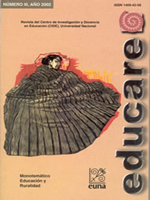Educación rural en América Latina y el Caribe: un desafío hacia el futuro
DOI:
https://doi.org/10.15359/ree.2002-3.8Abstract
A description is presented of the main aspects that have been affecting the marginality of rural areas regarding the benefits that a comprehensive development concept should provide. Based on an assessment of the concept of sustainable development, the author has proposed that the "subject" of development must be all the inhabitants of rural areas. This implies taking into account the analysis as well as social, economic, political and ecological dimensions so that they can contribute to strengthening the development of rural areas.
The lack political will –from the author´s point of view– prevailing in Latin America among governmental authorities, has made it impossible to transform men and women in rural areas. It would appear that they should have an equal opportunity to learn, receive education and become part of the rest of the social forces.
References
Araujo, J.E.; Franco, A. (1985). Algunas políticas agrarias que puede retardar.el crecimiento poblacional urbano. Desarrollo Rural en Las Américas. San José, Costa Rica.
Berroteran, l. et al. (2000). Innovaciones en la educación técnica
agropecuaria. Managua Nicaragua, INATEC-STOAS.
Conferencia Mundial sobre la Enseñanza de las Ciencias Agrícolas (1970, Copenhague, Dinamarca). UNESCO/FAO.
Contreras, Y.; Roque, P. (1998). Sembrando esperanzas. La superación de la pobreza mediante el desarrollo de la inteligencia en la infancia y juventud. San José, Costa Rica, UNICEF-PNUD-IMAS.
Finchman, G.; Hernández, l. (1990). Movimiento indigenista, especificidad étnica y educación en América Latina. Nueva Educación (Arg.) 12(2): 40-46.
Labelle, T.J. (1984). Liberación, desarrollo y educación rural no formal.
Anthropological and Education Quaterly 15(1): 80-93.
Lewin, K.; Little, A.; Colclough, C. (1983). Efectos de la educación en los objetivos del desarrollo. Prospects (England) 13(3): 299-3 l l.
Marull, J.D. ( 1978). Desarrollo rural en América Latina. Desarrollo Rural en las Américas 8(2): 125-136.
Reunión internacional sobre planificación educativa en países multilíngües. (1978). Conclusiones y recomendaciones. In lenguaje y Ciencia (Perú) 18: 17 -22.
Viñas- Roman, J .A. ( 1986). Generalidades sobre política de educación
rural en la República Dominicana. Santo Domingo, Rep. Dom., Fundación para el Desarrollo de la Juventud Rural.
Viñas- Roman, J .A. ( 1991 ). La juventud en actividades de desarrollo rural. In Reunión del Consejo Asesor Iberoamericano de Juventudes Rurales. Santo Domingo, Rep. Dom.
Published
How to Cite
Issue
Section
License
1. In case the submitted paper is accepted for publication, the author(s) FREELY, COSTLESS, EXCLUSIVELY AND FOR AN INDEFINITE TERM transfer copyrights and patrimonial rights to Universidad Nacional (UNA, Costa Rica). For more details check the Originality Statement and Copyright Transfer Agreement
2. REUTILIZATION RIGHTS: UNA authorizes authors to use, for any purpose (among them selfarchiving or autoarchiving) and to publish in the Internet in any electronic site, the paper´'s final version, both approved and published (post print), as long as it is done with a non commercial purpose, does not generate derivates without previous consentment and recognizes both publisher's name and authorship.
3. The submission and possible publication of the paper in the Educare Electronic Journal is ruled by the Journal’s editorial policies, the institutional rules of Universidad Nacional and the laws of the Republic of Costa Rica. Additionally, any possible difference of opinion or future dispute shall be settled in accordance with the mechanisms of Alternative Dispute Resolution and the Costa Rican Jurisdiction.
4. In all cases, it is understood that the opinions issued are those of the authors and do not necessarily reflect the position and opinion of Educare, CIDE or Universidad Nacional, Costa Rica. It is also understood that, in the exercise of academic freedom, the authors have carried out a rogorous scientific-academic process of research, reflection and argumentation thar lays within the thematic scope of interest of the Journal.
5. The papers published by Educare Electronic Journal use a Creative Commons License:














 The articles published by Educare Electronic Journal can be shared with a Creative Commons License:
The articles published by Educare Electronic Journal can be shared with a Creative Commons License: 



